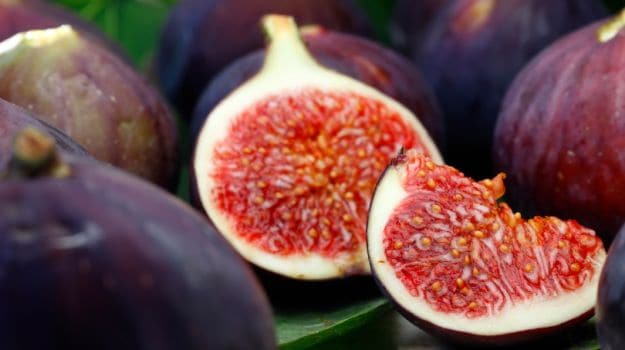Figs or Anjeer is a popular seasonal fruit hailing from the mulberry family. Fig trees were first known to have grown in parts of Asia an Africa, specially around the Mediterranean Sea. With the popularity of this succulent fruit growing over the centuries, figs are now cultivated across the world. Figs are available in many different colours like purple and green. The fruit has a sweet, juicy flesh loaded with crunchy seeds. In India, you would mostly find the sweet and juicy fruit in its dried form, but there are many who like to consume it fresh as well. Fresh figs, when compared to their dried counterparts, are lower in calories and sugar content, which makes them a safer alternative for diabetics. Dried figs, on the other hand, are a concentrated source of calcium. Did you know a single fig is packed with as much as 13 mg of calcium! Figs are also loaded with vitamins A, B, and minerals like phosphorus, calcium, iron and potassium. Another factor which makes figs such a favourite amongst nutritionists is its high fibre content. Fibre-rich foods help regulate blood sugar levels, and keep your cholesterol levels in check. Consuming such foods helps induce a feeling of satiety, which makes you binge less and facilitates weight loss in the long run. Fibre is also very crucial in maintaining good digestive health. Perhaps this is why eating soaked anjeer (figs) has been one of India's most trusted home remedies to cure constipation.
(Also Read: Is it Safe For Diabetics To Have Figs or Anjeer? Read To Know)

Eating soaked anjeer (figs) has been one of India's most trusted home remedies to cure constipation
Constipation and How To Tackle It?
Constipation is defined as a condition where a person has a difficulty in emptying or clearing out the bowels. According to a latest study, about 22 percent of Indians are constipated. Yet it remains one of the least discussed conditions in the country. If left untreated, chronic constipation can lead to anal fissures, itching, pain, and even bleeding. Mild constipation on the other hand could be averted with a handful of preventive steps and home remedies. Eating 2-3 dried figs soaked in water overnight is one of them.
According to the book 'Healing Foods' by Susan Curtis, Pat Thomas and Dragana Vilinac, Figs are an exceptional source of fibre. Including fibre rich foods is vital for maintaining a healthy digestive system, which in turn may prove effective in reducing chances of constipation.
Fibre adds bulk to the stool, softens it and helps relieve constipation. Anjeer is one of the best natural laxatives you can add to your diet. Both dried and ripe figs are an exceptional source of soluble fibre, which along with constipation can also help relieve other digestive issues like Irritable Bowel Syndrome.
(Also Read: How to Eat Anjeer (Fig): 6 Delicious Ways to Add Figs in Your Diet)

Dried figs have the highest calcium content of all dried fruits
How Do Soaked Figs Help With Constipation?
People are mostly recommended to consume figs after soaking them in water overnight. Does this really help? According to experts, it does. Soaking figs in water helps the body to assimilate them better. Bangalore based nutritionist Dr. Anju Sood says, "There is no harm in munching dried anjeer either. Figs are a powerhouse of fibre. There are two types of Fibre: Soluble fibre and insoluble fibre. So when you soak figs in water, soluble fibre gets broken down and gets easier to assimilate."
How to eat figs to manage constipation?
1. Soak 2-3 dried fig in water and leave them overnight.
2. Consume them in the morning
For best results, repeat this daily for a month, every morning. For long term constipation management, it is imperative that we consume a healthy diet with enough fibre-rich foods like wholegrain cereals, vegetables, fruits and salads.
About Sushmita SenguptaSharing a strong penchant for food, Sushmita loves all things good, cheesy and greasy. Her other favourite pastime activities other than discussing food includes, reading, watching movies and binge-watching TV shows.












